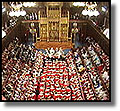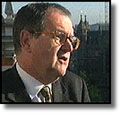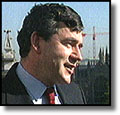|
You can hear the whole proceedings as broadcast on BBC Radio.
Pledge To Set Nation On New Course
Labour has outlined its agenda for government in its first Queen's Speech for 19 years, promising to point Britain in a new direction and to govern "for the benefit of the whole nation".
The legislative programme announced by the Queen amid the high ceremony of the State Opening of Parliament contains more than 22 proposed Bills.
The speech also contained strong commitments to high levels of employment and a return to the first major programme of national house-building for well over a decade.
In a clear change of tone, the tradition of the Queen's Speech dealing first with foreign affairs and Europe was ditched, with measures on schools and jobs topping the address to the nation.
"My Government intends to govern for the benefit of the whole nation," said the Queen. "The education of young people will be my Government's first priority. They will work to raise standards in schools, colleges and universities and to promote lifelong learning at the workplace."
"My Government has pledged to mount a fundamental attack upon youth and long-term unemployment," the Queen said.

|
|
Out with the old and in with the new
|
The package reflects a blend of policies strongly based on key Labour manifesto commitments - on jobs, improving the NHS, cutting class-sizes and tackling crime, particularly by young thugs - and major constitutional change.
It's a mark of Tony Blair's determination to hammer home the theme that his programme is designed to "bring the nation together and equip the country for the future".
Top of the list of Bills were two on education, aimed at reducing class-sizes, driving up educational standards and reforming schools organisation and the teaching profession.
A Crime and Disorder Bill, including measures to speed up the sentencing of young criminals, is a key proposal alongside a Firearms (Amendment) Bill to offer a free vote on banning all remaining handguns.
On jobs and pay, the Finance Bill will deliver the windfall tax on privatised utilities to pay to put young, unemployed back to work while the National Minimum Wage Bill will bring in a Low Pay Commission to help fix a bottom-line for hourly wages.

|
|
Packed House of Lords
|
An NHS (Private Finance) Bill is aimed at allowing NHS Trusts to enter into partnerships with firms within the Private Finance Initiative aimed at bringing private funds into public sector schemes.
Labour's proposal to channel mid-week lottery profits into extra education, health and technology projects is also in the Speech as the National Lottery (Amendment) Bill.
There is a hefty constitutional agenda with measures for referendums in Scotland and Wales ahead of plans for a Scottish Parliament and a Welsh Assembly.
London could see the return of its own strategic authority, plus an elected mayor, after a referendum and the English regions will have powers to create Regional Development Agencies.
Not in the Speech are planned reforms to the House of Lords - squeezed out through lack of legislative time.
On the broader stage, the pledge to adopt the European Convention on Human Rights in domestic law is included in the package after fears that it might become a longer term aim.
The banning of tobacco advertising will be outlined in a White Paper - one of three proposed, the others on Freedom of Information measures and international development.
There is no promise of Parliamentary time for the Wireless, Telegraphy (Radio Spectrum) Bill, though it is identified as a likely contender for the first session.
The prospect it provides of netting £1 billion in extra revenues, largely from mini-cab operators and mobile phone users, is likely to prove too attractive for Chancellor Gordon Brown to resist.
The Shadow Chancellor of the Exchequer, Kenneth Clarke, questioned Labour's ability to manage the "nitty gritty" detail of government. Ministers were getting praise now for all sorts of things, he said, but in 18 months' time the hollowness of their promises would become apparent.

|
|
Alan Beith: worried about resourcing
|
| |
The Liberal Democrats' deputy leader, Alan Beith, said he welcomed much of what the Government was proposing as it reflected his own party's thinking.
He was worried, however, that Labour would not have the resources to put its ideas into effect, particularly when it came to improving standards in education. (The Liberal Democrats had promised to increase income tax to fund this.)
The State Opening of Parliament provides Britain with one of its more peculiar rituals - involving door-slamming and hostage-taking. Although the Queen plays a major role, the whole ceremony is intended to demonstrate her subservience to the will of the elected representatives of the people.
|






